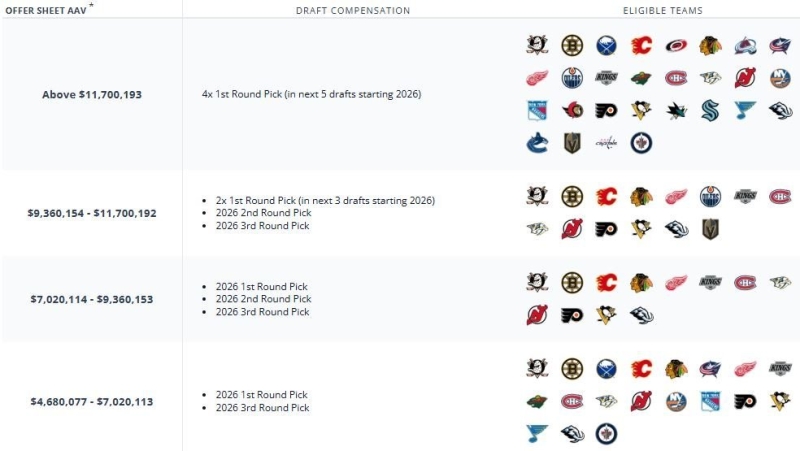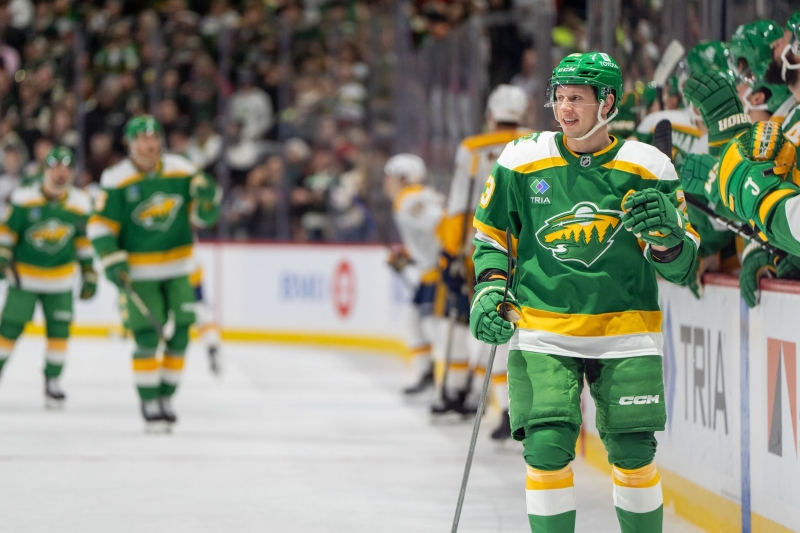The offseason is a strange time for a hockey blog. In less than one week, the draft and free agency created enough news to fill an encyclopedia. Days later, the news cycle dries up and leaves us hyper-focused on Day 2 draft selections and obscure language in the CBA.
Most well-adjusted hockey fans (not you, dear reader) can usually unplug from the NHL until at least September. That leaves a unique audience for writers to delve into any topic they choose.
To that end, I’ll be going deep on the Marco Rossi contract negotiation. What is an RFA? What is an offer sheet, and why would Rossi’s agent shop for one?
Most importantly, which side has the leverage, and how does that affect the Wild’s salary cap?
First, let’s look at Rossi’s options. As a Restricted Free Agent (RFA), he can technically sign with any team in the NHL; however, if another team signs Rossi, they must send draft picks to the Minnesota Wild based on amounts outlined in the NHL rules.

Rossi’s AAV will likely come in around $7 million, so the only teams eligible to sign him are pictured in the bottom right. That depresses Rossi’s value for two reasons.
First, supply and demand. Instead of 32 eligible teams, only 19 teams are eligible to sign Rossi at an AAV between $5 million and $7 million.
Second, and more importantly, the draft pick compensation depresses Rossi’s market value. For all other teams, Rossi’s contract value is a basic math problem: the value of his on-ice production, minus the value of those draft picks.
NHL teams have two currencies for acquiring players: draft picks and salary cap dollars. If Rossi costs a 1st- and 3rd-round pick, his value for all other teams is reduced. Hence, the lower cap-dollar cost for RFA contracts.
According to NHL rules, if Rossi decided to sign with another team at that depressed value, the Wild would only need to match that salary number. Therefore, his total market value for any team is reduced. According to my estimates, league rules will reduce his contract value by about $11 million, about $2.5 million per year on a four-year deal.
That $11 million number is fluid because different teams may value draft picks differently. For example, the Los Angeles Kings may consider themselves contenders, which would mean they would likely select later in the draft. Furthermore, the players they take may not reach the NHL by the time LA wants to compete. Still, that $2 million figure is sufficient for an estimate.
In most RFA negotiations, that makes it easy for the team with that player’s rights (in this case, the Wild) to re-sign that player at a cheap AAV. In many cases, the player’s agent won’t even seek a competing offer. Instead, they’ll create an estimate of the player’s RFA value, meet with the player’s home club, and get something done.
However, Rossi’s deal is different.
Several factors are at play here that aren’t directly related to the negotiation. One is Rossi’s size and play style, and another is his demotion to the fourth line during the playoffs. The Athletic’s Michael Russo has reported that Rossi was unhappy with his playoff usage. Russo has also highlighted on his podcast that it created a lack of trust, which may make Rossi wary of a long-term deal in Minnesota.
Unrelated to that dynamic, however, is the amount of pressure on Bill Guerin to ice a winner in October.
The team has publicly acknowledged that they want to win a championship — now. While Bill Guerin may debate how much of a role Rossi could play in that goal, everyone knows that a 1st- and 3rd-round pick would do nothing to contribute to that goal.
All other options to replace Rossi have been exhausted. Minnesota examined the trade market for Rossi’s rights, striking out on JJ Peterka and any other options. They were unable to sign a top-six center in free agency. Marco Rossi is all that’s left.
While league rules may have depressed Rossi’s RFA value, he has some leverage over the Wild.
On the other hand, Rossi only has leverage over one team. He can’t use that to leverage a better deal, because that team happens to control his signing rights. That’s likely led to this game of chicken. So far, nobody is diving off the tractor.
And why should they? Guerin needs to preserve as much cap space as possible for injury emergencies and future player acquisitions. After heart-related COVID complications, Rossi knows better than most 23-year-olds.
That’s why Rossi’s agent is shopping for an offer sheet.
Essentially, that offer sheet is the best deal Rossi can find with another team. Guerin will have a week to match that contract, or allow him to sign with that team in exchange for the draft picks attached to whatever AAV Rossi’s agent can bid up.
Whether or not Rossi wants to play for the Wild next year has nothing to do with it. It’s the only mechanic left that can force the two sides to come together on a contract.
So why all this back and forth? Why don’t RFA agents do this immediately every July 1?
There are several reasons that would make home clubs their own RFAs, rather than match an offer sheet, which would theoretically inflate his value to the Wild. For example, if Rossi signs an offer sheet, Minnesota can only match the contract as it is signed with another team; they won’t be able to adjust the contract structure or term to meet their own preferences.
Another reason Minnesota should prefer to sign Rossi on their own is that league rules prohibit teams from trading a player on a matched offer sheet until a calendar year after their home club matches the contract. In other words, if the Wild match a Rossi offer sheet on August 1, they can’t trade him until August 1, 2026.
Both the contract term and Rossi’s trade eligibility are crucial points in Minnesota’s roster flexibility at the 2025-26 trade deadline and next offseason. Matching an offer sheet takes away that flexibility.
That all means that Rossi and Guerin are likely to end up on the same side by the end of this. The only way Rossi could become expendable is if the Wild replace him with Danila Yurov or via trade. That trade can’t happen unless they find a contract together, and Yurov hasn’t played a game on an NHL ice sheet yet.
In other words, Guerin needs Rossi on this Wild team.
Maybe Guerin hates the idea of Rossi as a top-six center. If he does, it doesn’t matter. There’s no other option on the market.
Maybe Rossi’s feelings are irreparably damaged by his demotion to the fourth line. Even if that’s the case, there is one final failsafe:
A few million dollars can smooth over a lot of hurt feelings.
